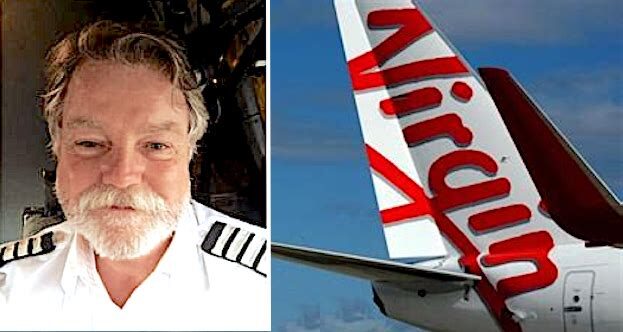
"When correlated, the data indicate there is an enormous problem that is having, and will have, a significant impact on aviation safety worldwide. There is enough evidence to be sending out red flags."There have been many tragedies this year. Phil Thomas, a young graduate of the Cadiz, Spain, flight training academy, fell ill and died suddenly in April. There were five pilot incapacitations in March including a British Airways pilot who collapsed and died in Cairo, Egypt not long before he was due to fly.
Pilots are super-fit, so why are so many dying suddenly or collapsing? Cpt Murdock concludes they are suffering severe adverse reactions to the Covid-19 vaccinations, which has myocarditis (heart inflammation), brain fog, insomnia, blood clots and anaphylaxis as side effects.
He thinks some pilots are ticking timebombs and claims many are not declaring ill-health. He said:
"They are not reporting brain fog, heart flutters and dizzy spells because they don't want to lose their jobs."Aviators have comprehensive annual health checks, or six-monthly if they have been ill. Rules state they can pass only with a less than 1 per cent chance of suffering an illness that could incapacitate them.
How are they passing medicals if they are suffering serious adverse reactions?
Last year the global aviation regulator, the Federal Aviation Administration (FAA), changed the electrocardiogram (ECG) markers that measure the 'PR interval'. This is the time it takes for an electrical impulse to travel from one part of heart to another and is an indicator of heart health. The new limit is 50 per cent longer than the previous limit, and means that if a pilot has developed a heart condition, it could slip past.
It was November 15, 2021, when Australian airlines mandated Covid-19 vaccines for 900 pilots, and all air and ground crew. Pfizer, AstraZeneca, and Moderna were available in Australia.
Today is the third anniversary of that mandate and Cpt Murdock is one of 12 pilots who refused. He was sacked of course, accused of serious professional misconduct, a charge generally reserved for inappropriate sexual behaviour or reckless and dangerous behaviour.
Mr Murdock, 60, who lives near Sydney, Australia, flew as Captain for Virgin Australia for 20 years, and has held a licence since 1984. He also has an MSc in Aviation Human Factors, the science behind how humans interface with machines. He said:
"Somewhere on the international network daily, you will find a plane has been turned back because of a health emergency. Either a passenger health emergency or crew health emergency."When pilots put out a mayday radio call to air traffic control, it is nicknamed a 'squawk'. They use the code 7700 for all mayday calls which are reserved for serious incidents like pilot incapacitation or an uncontained fire on board. Few scenarios warrant a mayday; passengers and crew must face genuine peril.
There has been an unprecedented rise in the numbers of mayday calls as tracked by a bot set up by the X account @GCFlightAlerts. It posts when a pilot squawks 7700 anywhere in the world.
Between 2018, and 2019, the mayday average was 29.1 per cent of all distress calls. During 2022, mayday calls increased by 272 per cent. In the first three months of 2023, the increase was 386 per cent. The graph shows there was an instant, steep increase when the vaccines were mandated to pilots.
The average age of death in Australia during the pandemic was 85.3 years. The figures did not justify mandating vaccination to healthy, fit, pilots and implementing a no jab, no job policy.
It even violated their own guidance: according to FAA rules, no pilot is allowed to take any type of medicine unless it has been approved and in use in the general population for 12 months. Pilots are forbidden to take part in drug trials and all Covid-19 vaccines were allowed under emergency use authorisation.The final phase of the trial finishes this year.
Cpt Murdock also looked at the number of multi-crew licences issued by Australia's regulator, the Civil Aviation Safety Authority (CASA). They have the authority to impose restrictions on Airline Transport Pilot's Licences (APTL).
A multi-crew licence restricts pilots to operating with multiple crew members and is issued when their medical status shows a possibility that they may become incapacitated whilst flying.CASA monitors and administers medical certification and licensing for all Australian pilots. Freedom of information data shows there has been an unprecedented increase of 126 per cent on limitations.
You would think this would prompt a major review by CASA, but they will do nothing while Australia's drug watchdog, the Therapeutic Goods Administration (TGA), still endorse Covid-19 vaccination for all. It is a revolving door avoiding responsibility that is familiar to those of us investigating vaccine issues.
Cpt Murdock thinks lack of action can have only one result, and bear in mind we have seen many planes make emergency landings because of pilot incapacitations. He is unequivocal and said:
"Disasters will occur and both aircrew and the traveling public will die unnecessarily."
About the Author:
Sally Beck is a freelance journalist with 30 years of experience in writing for national newspapers and magazines. She has reported on vaccines since the controversy began with the MMR in 1998.




Because as with electric cars of very limited range, governments of the West are trying to make citizens effectively prisoners - the China model - of "open air prisons". If the airlines industry collapses because of damaged pilots - then the lowly citizen cannot travel by air and is trapped inside the area designated "accessible" by governments.
Obama, who seems to be the devil incarnate, has used this phrase for his enemies (real people) - as to the politicians - the future should not belong to politicians who coerced people and pilots into taking the poison vaccine.